
When you fly into a country’s busiest airport and it only has 2–5 flights a day, you know you’re in for something different. Secluded from the world in the Eritrean highlands lies a timeless gem of a city named Asmara. And, like unearthing a precious mineral, discovering it feels like you’ve found something rare, something of value and beauty. Asmara is a unique city, like a benevolent spell that passively guides you into a peaceful state of mind.
More than any place I’ve been to in the world, Asmara is a feeling.
Asmara is felt in the deep blue sky—the kind you can only see at an elevation of 7600 feet above sea level. It’s felt in the comfortable weather, with daytime highs in the 70’s and nights in the 50’s. In the palm-tree branches lazily waving in the breeze. In the treasured café culture….
Asmara is felt in the warm smiles and curiosity of the locals, in the curvy script of the Tigrinya alphabet on signs, and in the purple jacaranda trees. It’s felt in the many traffic lights that don’t work, but don’t matter since all movement flows slowly and methodically.
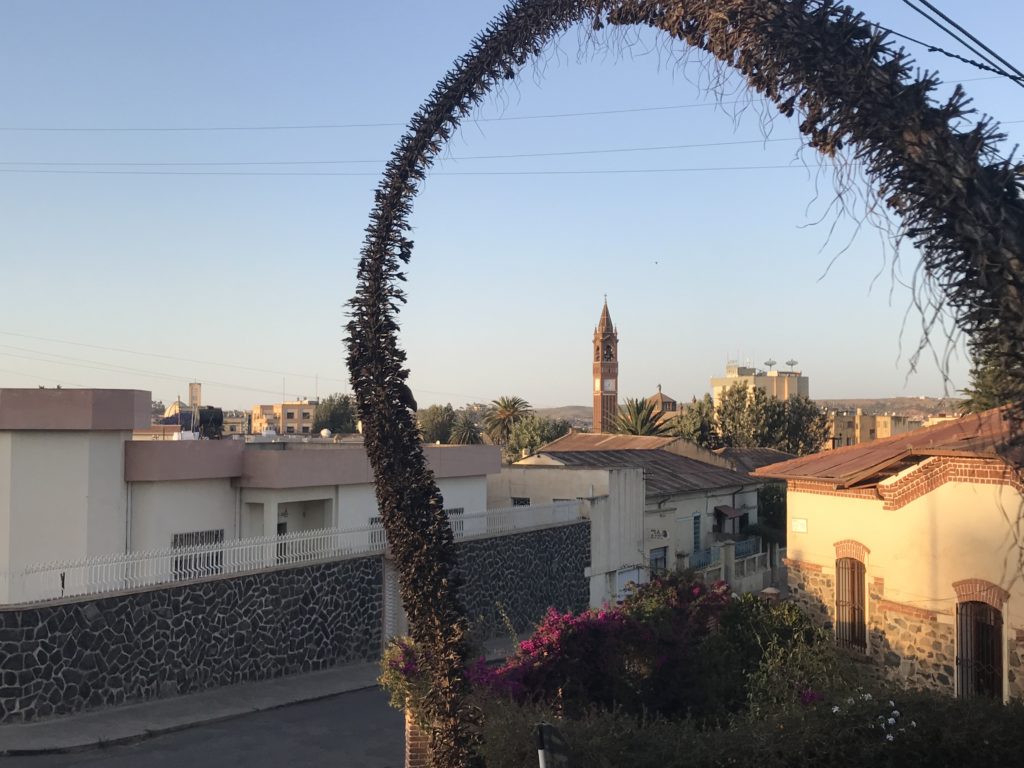
A quiet back street in Asmara
Usually, it takes a tropical island next to the sea, devoid of urbanism, to create this relaxed sensation, but Asmara is a city of roughly one million people that sits at an elevation considered a high mountain summit in most places. In a way, the city and country at large are like an island. The only way into Eritrea is by flying; there are no land crossings open to foreigners. The country is on lockdown, and its most remarkable success is that it’s a safe place in one of the world’s toughest neighborhoods.
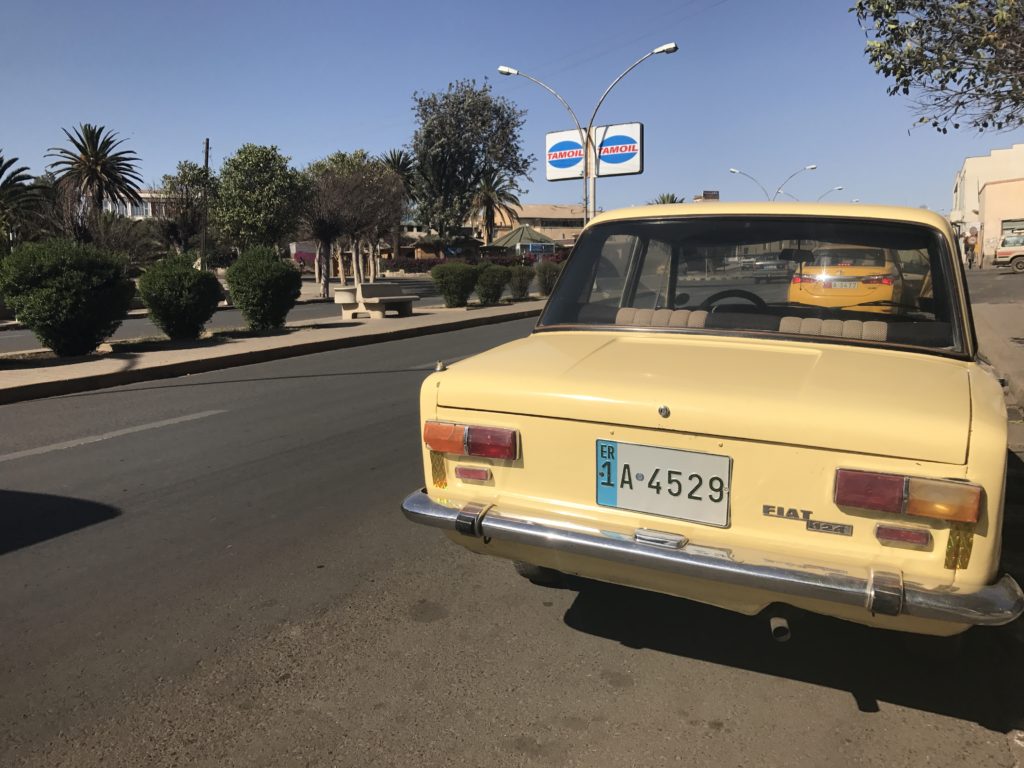
Old Italian cars all around Asmara
Asmara is a city stuck in time, and while most of the world has grown rapidly, very little has changed here in the last thirty years. There are no major western brands taking up storefronts, and no chain businesses (with the exception of the bulletproof companies, Coca-Cola and Western Union, which have somehow penetrated the sanctions and managed to thrive here).
Old cars dominate the roads (apart from a few Toyotas and Hyundais), people use functioning payphones, and there are no overt advertisements on billboards, except those for the nation’s one condom company, which uses the tagline “Because Life is Everything.”
But what Asmara lacks in technological advancement and economic progression, it counters with in feel: soul, chill time, and a natural focus on human connections.
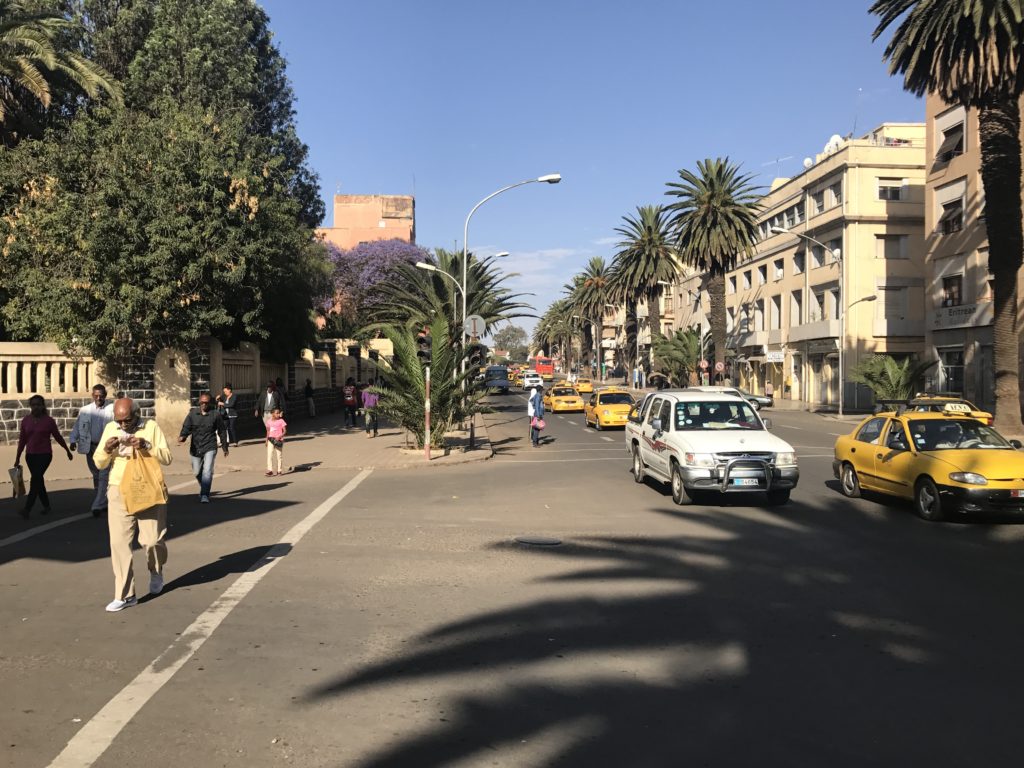
Harnet Avenue
The main thoroughfare, Harnet Avenue is the heart of the city, and once the workday ends, the city gets together and cruises down the long sidewalks, back and forth, on foot. I’m not exactly sure why, but there’s a palpable confidence in the air—more so than anywhere I’ve been. People walk with assurance devoid of arrogance; even the many physically disabled people on the streets have a certain amount of “heads up” attitude. It’s a city where everybody seems to know each other; they hug, kiss, and give each other the most original Eritrean-style “bro shake” (in video).
As a traveler in Asmara, you’re never alone. You’re never alone because people are curious and interested in why you are in their city. After just a few days, people knew us; it was normal to get a loud “hello,” a bright smile, and a wave from across the street. It’s impossible not to feel connected here. There are virtually no tourists, so it’s mostly you and the locals.
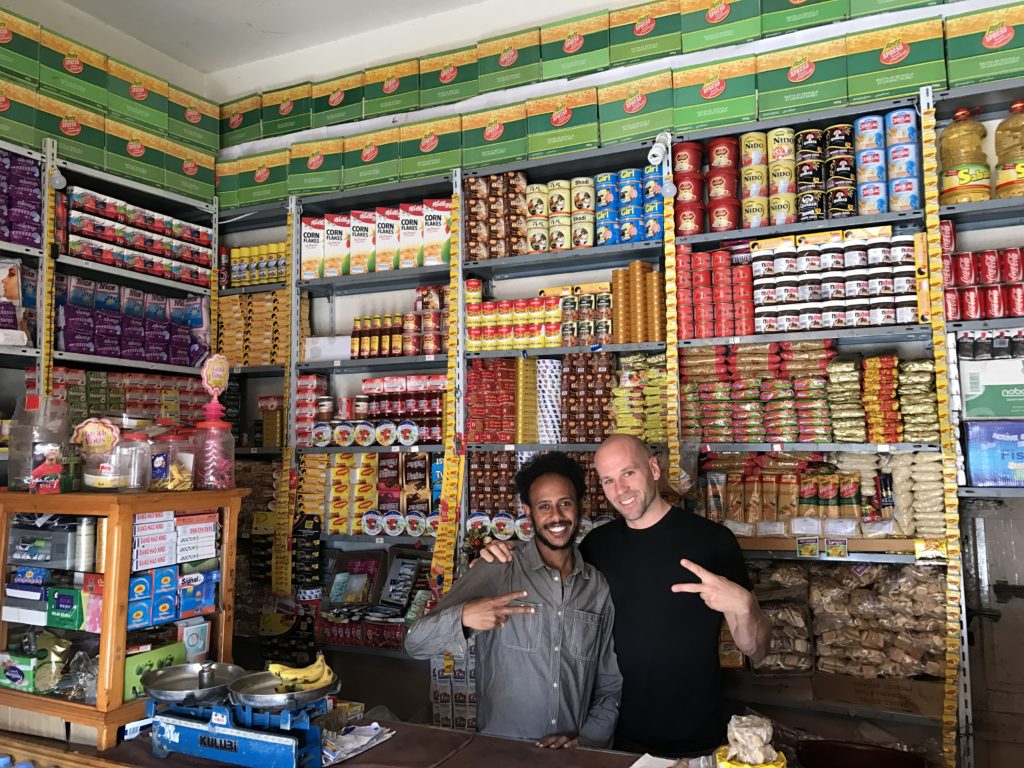
Warm and open people
There are some simple gateways into locals’ friendships, starting with that radical handshake. It’s made up of a slap of the hand, an embrace, and multiple shoulder bumps. Dropping one word of the local language, Tigrinya, is like the key to a chest of treasures. They have this word—“Gaila ient”—which means something like “super cool” or “awesome.” This potent phrase evokes laughter and fired-up behavior in all situations.
Life in Asmara resembles what life was like pre-Internet. People aren’t looking at screens—they are looking at each other. Technology has generally reduced face time in the modern world, shortened our attention spans, and has tried to solve the void of physical connections through platforms like Facebook and Instagram. But Asmara hasn’t lost that connection in the first place. It’s an inclusive land; there’s very little distraction from traditional relationships.
Most of the world has had a long-lasting relationship with the Internet; Asmara hardly knows of it. To open just one web page is a great accomplishment, but forget about getting two or three pages in unless you’re lucky and surfing at midnight, when online usage is quiet. The country will test your patience on this front. Nothing practical is done online; forget e-bill payments, YouTube, and buying airline tickets.
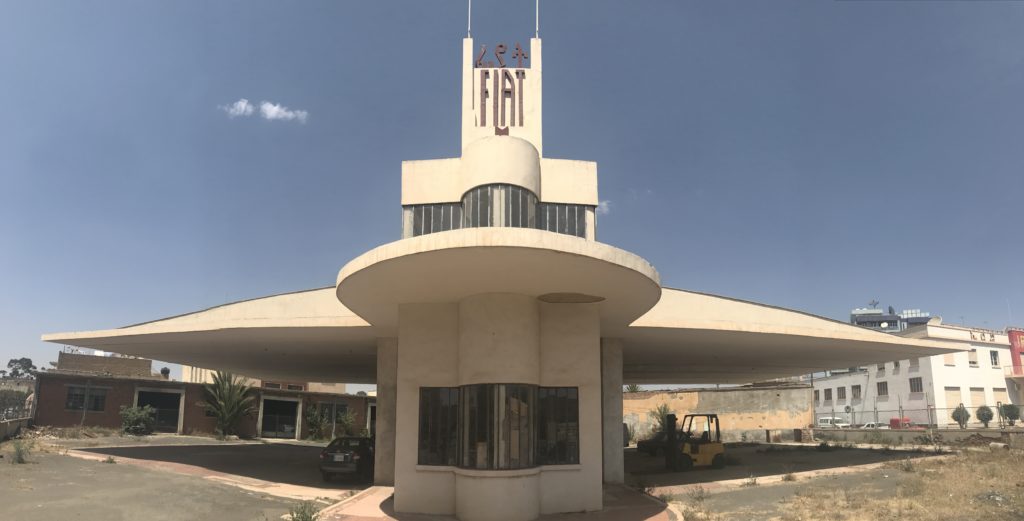
A vacant gas station. Asmara was an Italian playland for architecture….
Just because technology is decades behind here doesn’t mean the population is uneducated or primitive. People speak the native language, Tigrinya. Many also speak Arabic, English, Aramaic, and some of the elders speak Italian. Satellite television brings the world to Asmara; even shacks with scrap-metal roofs have satellite dishes on top. America is viewed as utopia through the Hollywood lens. There’s only one domestic television channel in the country; the government owns it.
Quite often, small countries adopt the popular music of bigger countries, and are addicted to the latest American hit. Here, they have a distinctive sound that they listen to, and they don’t rely on western music to be hip and cool. There are many talented saxophone players. But, like in other nations sitting next to more influential, but culturally similar ones (like Ukraine to Russia or Canada to America) Eritrea also enjoys Ethiopian music and pop culture.
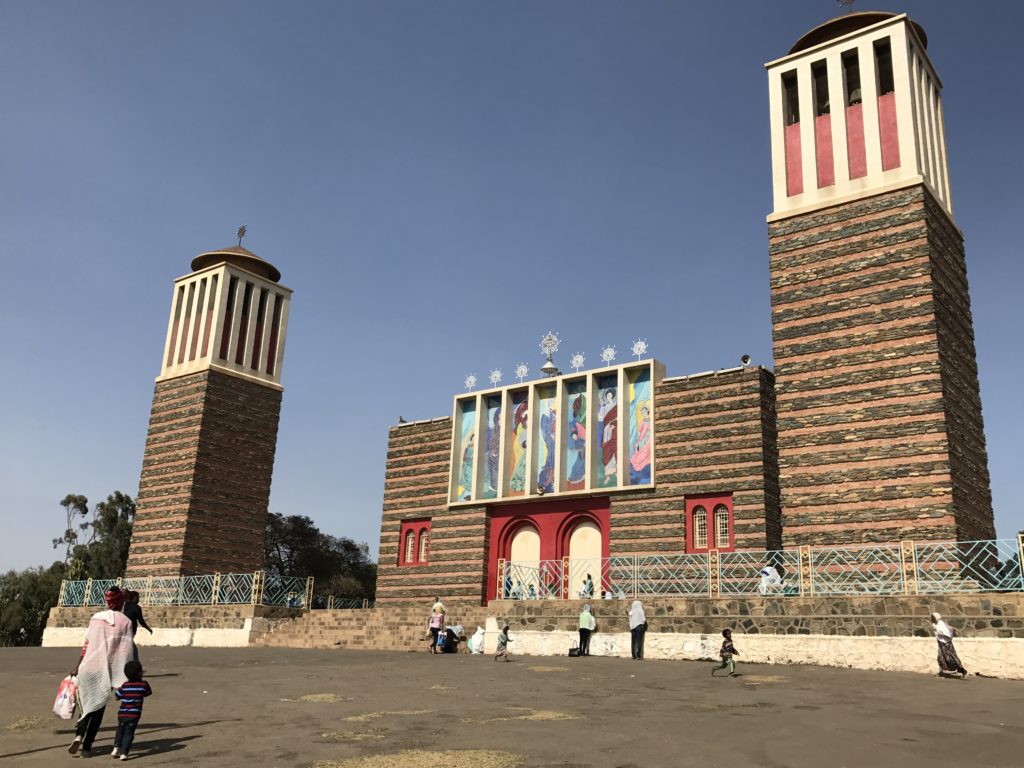
Art Deco-looking cathedral
The Italians colonized Eritrea for 52 years. And what they left behind doesn’t feel African: Art Deco architecture, cappuccino, and café culture, cycling and a love for the Tour de France, and pasta that’s cooked the right way with onion infused marinara sauce. There are many old Fiats from the Italian days—like the 50’s American cars cruising around Havana. The Italians spent money and creative capital, as seen in the flowy lines of the architecture and the wide sidewalks to enjoy a stroll; they didn’t leave out the good things when they attempted colonialism.
I met a few Italian tourists in Asmara. I always find it to be true that people from a former colonial power visit the colonized country more than anyone else (some of this obviously comes from old family/business connections). This can be seen with the Dutch in Indonesia or the French in Morocco. It’s interesting that there is usually an affinity between the formerly colonized country and the colonizer.
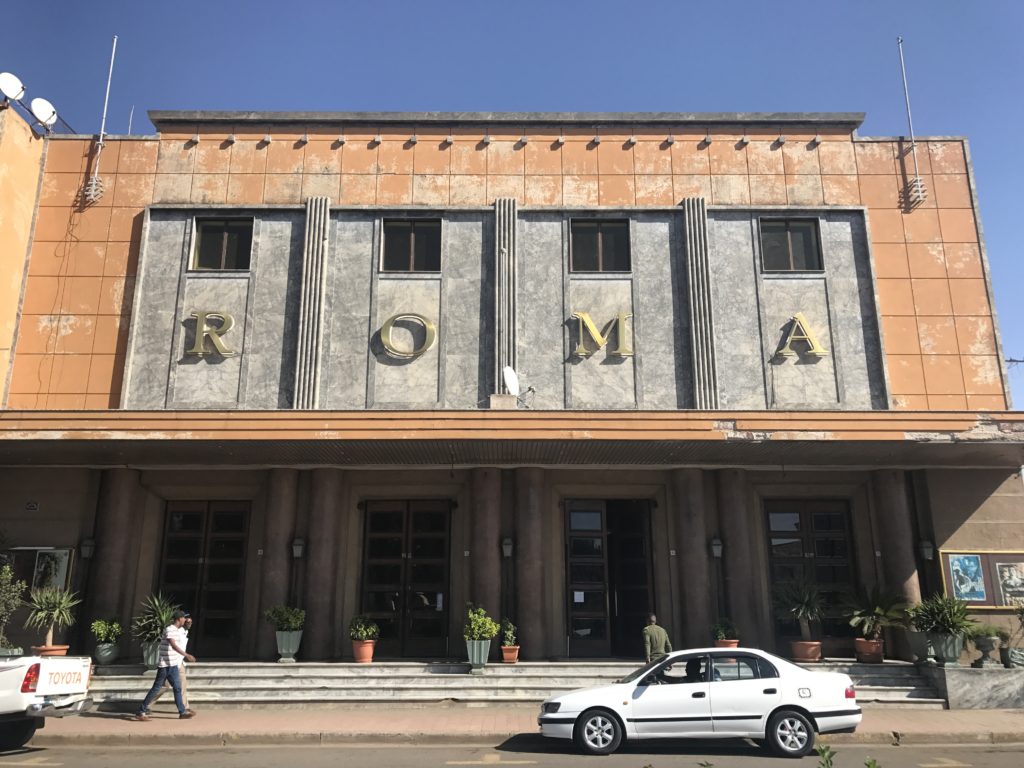
Retro theater
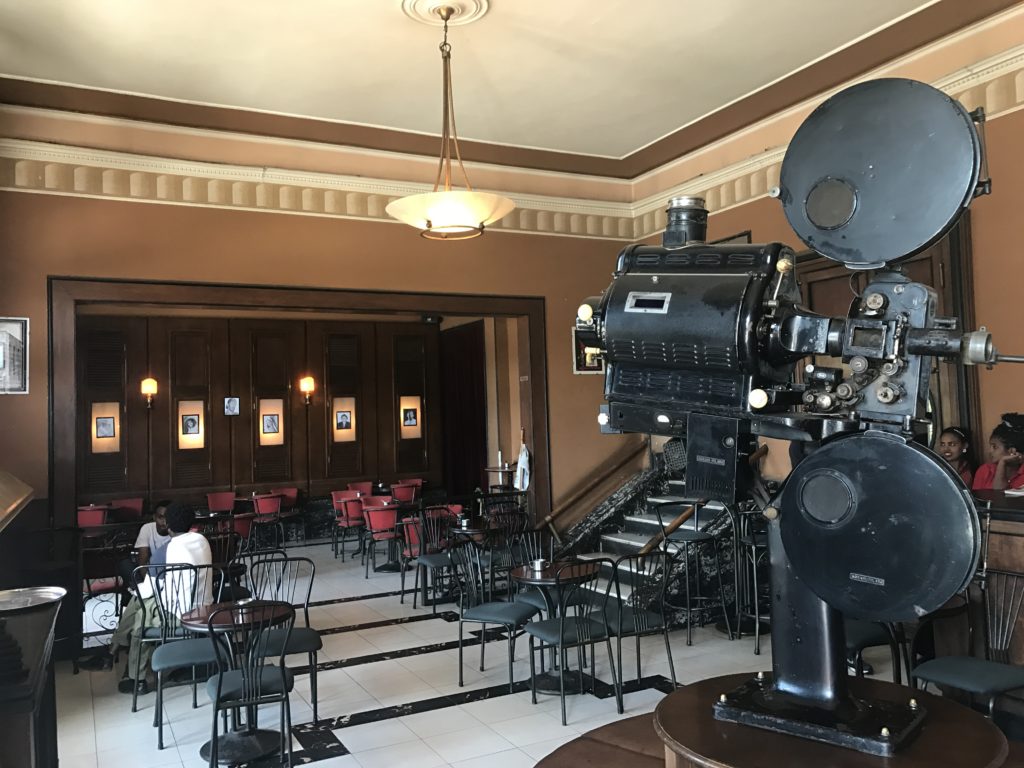
The Eritrean food is excellent, but if you get tired of the local food, you can fall back on Italian. And the Italian is stellar. Most everything is organic since this country doesn’t import much, and what’s domestic is free of chemicals. The tomatoes are on par with the ripe country garden tomatoes from my youth. No Monsanto here.
As a traveler, forget about using your ATM or credit card—you must come with all the cash you need in USD. The official rate of exchange for the Nakfa (the Eritrean currency) is 15 to 1 in the nationalized banks, but nobody does this because the rate is 25 to 1 on the black market. It’s one of the few corners of the world where I feel fine walking around with a mound of money in my hand (in video).
Asmara is known as the safest of all the major cities in Africa, and one of the safest in the world when it comes to violent crime. If I’m going to compare Californian cities, I feel much safer in Asmara than poorer parts of San Francisco or Los Angeles; in those neighborhoods, I feel my whiteness stick out. In Asmara, I forgot about skin color, even though there were days when my friend and I were the only white people on the streets.
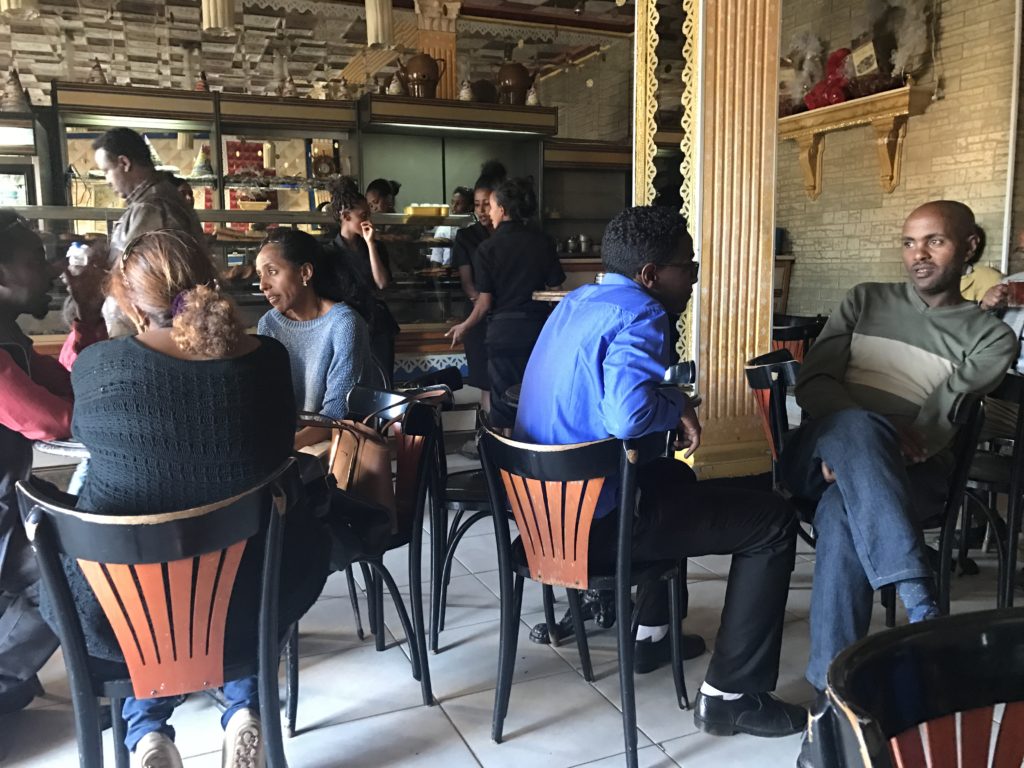
Cafe Culture
There’s another, darker force functioning beneath the surface here—one I couldn’t quite put my finger on. Some of the safest countries on the planet have the most hardened regimes. Eritrea is no exception. People don’t talk about politics because of fear. They don’t much like their pictures taken either because of fear. There’s a sense that the happy and peaceful side of Asmara can change—in one second—to prison and seclusion if an Eritrean crosses over the invisible but clear line.
There’s a steady flow of human capital gushing outward illegally, partially because citizens aren’t allowed to leave the country until the age of 30. The government worries about a lack of manpower to hold off the Ethiopians on the contentious border. Because of zero economic opportunity in the country, and life under an autocratic government, many ambitious Eritreans escape for a better go at life in Europe or make the long journey to the U.S.A. or Canada.
The route out has gotten much more difficult in recent years. Today, those who leave also have the ISIS element in Libya to worry about before they take a shifty boat ride across the Mediterranean to the not-so-opened-armed Italy. I heard stories of women who made sure they were well stocked on birth control to avoid the horrific fallout of a potential ISIS rape.
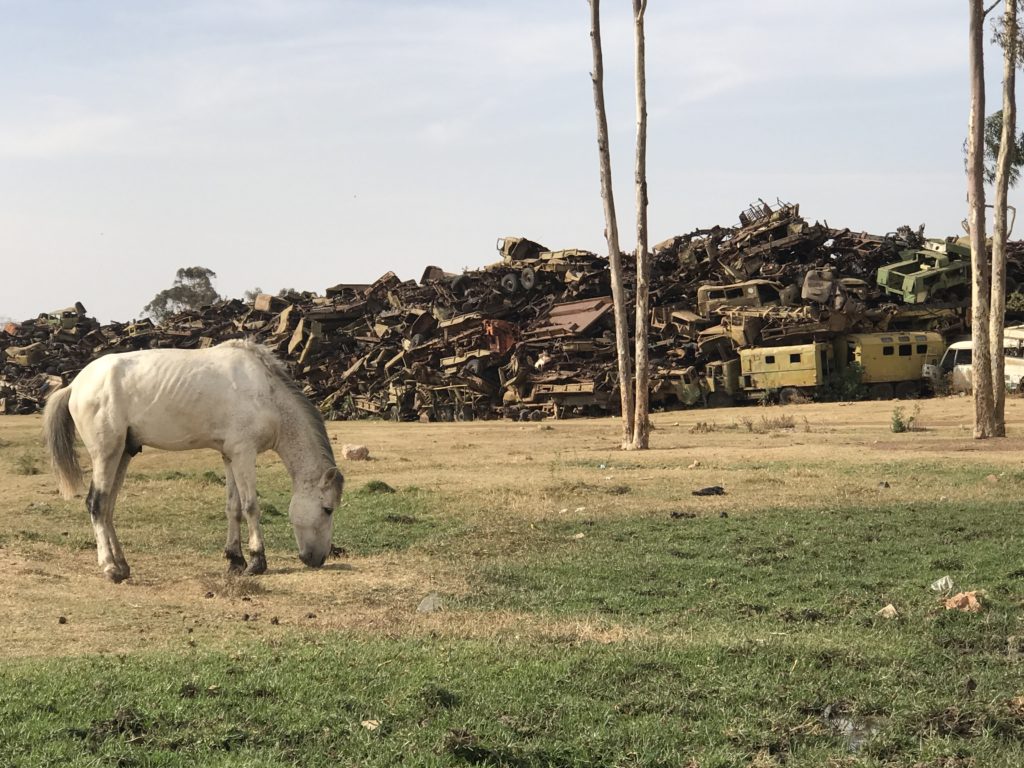
Tank graveyard outside of Asmara
The toughest life decision must be the one made by those who leave their country, culture and family; potentially forever—to risk it all in a foreign land. The thought of leaving and never coming home—taunts many of the youths’ psyche. They know returning most likely isn’t an option for fear of imprisonment or an unknown amount of military time.
That said, national identity is strong here. Perhaps this comes from the fact that the Eritreans managed to keep the big gorilla in the neighborhood, Ethiopia, out and landlocked. I was told that the Eritreans won because they had everything to lose and were fighting for survival. It’s still a mystery because they were heavily out-manned, out-armored, out-financed, and the big powers backed Ethiopia, but, somehow, they were victorious in keeping their sovereignty and the Red Sea coast. Perhaps this national pride spills over into Islam and Christianity because there’s a nice frictionless blend between the religions here.
Even though Eritrea is a religious country—it’s very sexually conservative and homosexuality can get someone locked up in prison—every bed stand in hotel rooms across the country has condoms instead of bibles.
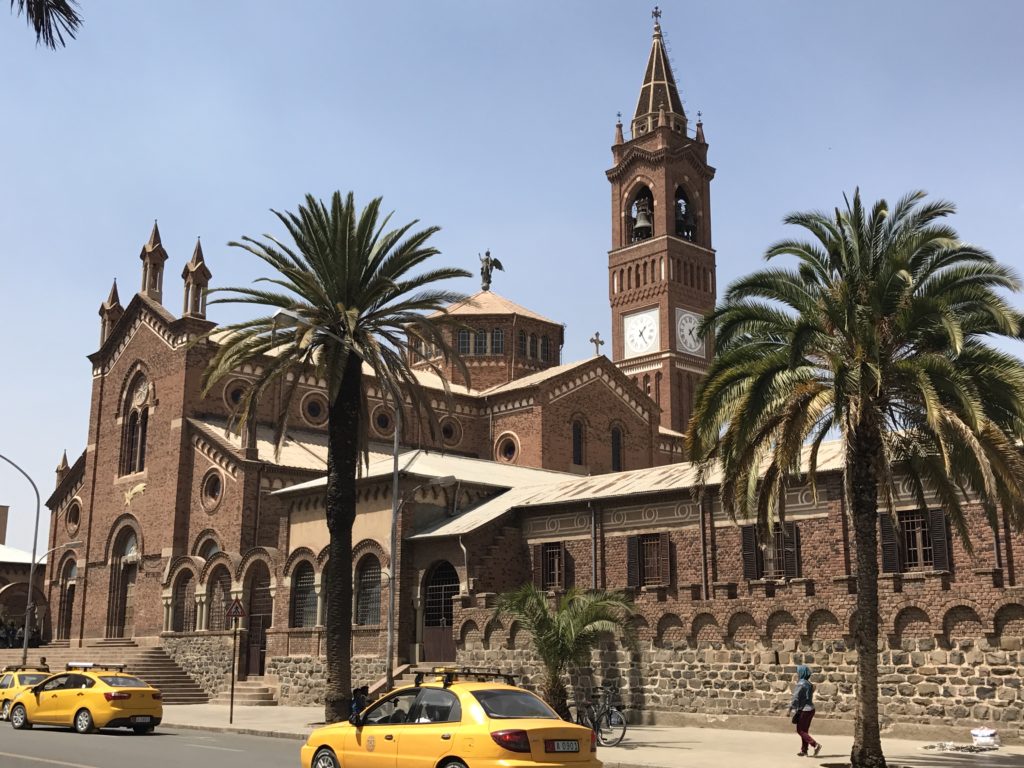
Our Lady of the Rosary Cathedral
I walked into a church service conducted in Italian. Small children stood fixated on the priest speaking the language of colonization. They likely didn’t understand it, but their parents did. The other “church service” is held in Asmara’s beautiful Art Deco theaters. These “churches” fill up, but only when soccer (football) is playing—the Arsenal/Liverpool game is the other real religion here.
Speaking of religion, marijuana is the devil. Eritreans sometimes drink copious amounts of alcohol without any moral concern, but one puff on a joint is a serious no-go. I don’t think there’s a joint on Eritrean soil, and if there is, it’s buried deeply behind many secrets. I find it interesting how government influence shapes public thought on “good and bad” when it comes to mind-altering substances.
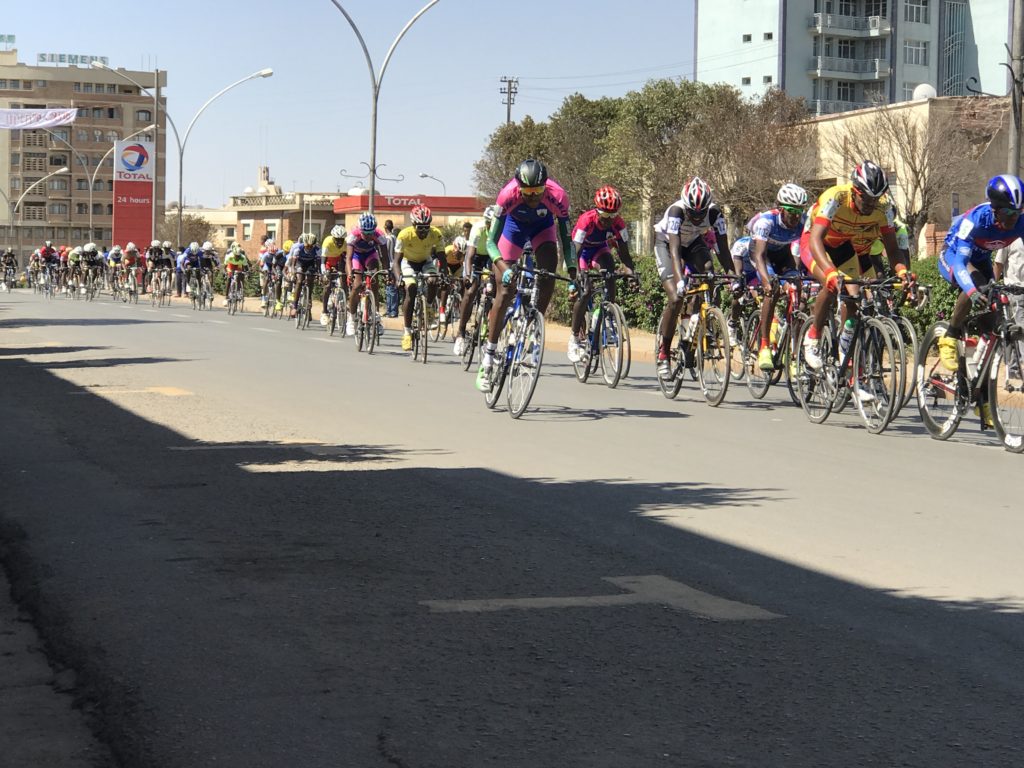
Cycling is huge here
Most people are poor, but most don’t look at it. They might pack themselves tightly into rudimentary living quarters, but many dress well, and (if they can) they spend every last cent they have on sipping cappuccinos and eating pastries at one of the many old-school cafes. Sweets and poverty don’t ruin the teeth here as much as other places since it’s common to chew on a unique tree branch that benefits dental hygiene.
Crushing poverty often brings out the animal in people; Asmara is one step above that. Nobody is starving on the streets. Wealth and abundance are on the opposite end of the spectrum and often creates insecurity and anxiety based on material competition. Asmara has neither of these forces in play; it’s at a humbled level of material status where nobody needs to get violent over scarcity, and nobody is bragging about excess. People are generous to the beggars.
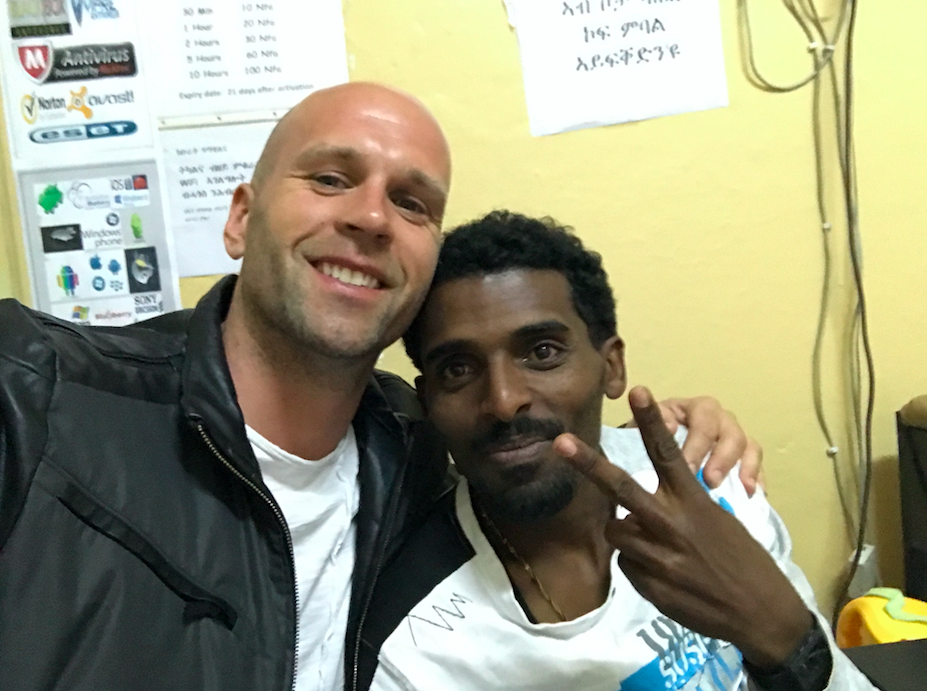
Mauri the marvelous
There’s a low amount of career-related stress here because nobody is trying to keep up with the Joneses; the Joneses are on permanent vacation in a country with a functioning economy. Asmara doesn’t even have one new-car dealership. The Eritrean economy is by most metrics, dead. It survives on the basics. Half of the country’s GDP must come from foreign remittances. Oddly enough, only two countries in the world tax their residents on foreign-earned income: the United States and Eritrea. Eritrea is a capitalist’s perfect storm nightmare—a classic example of too much bureaucracy poisoning any potential.
My friend and I stayed at a beautiful guesthouse where the owners wanted to do some basic renovations, but couldn’t get the permits from the government to pour new cement on their patio. The visa process is a pain, and to go anywhere in the country, travelers need to get permits for every town and city they visit from the ministry of tourism (there’s a ministry for everything here, and they all appear vacant). Asmaran time is one notch behind African time, which means slower than slow…
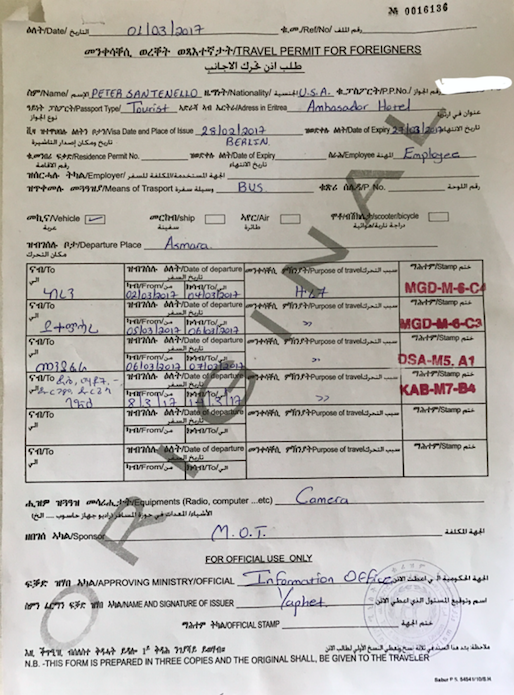
Permit needed for leaving Asmara
My time in Asmara and Eritrea felt both long and short. Time did something funny, and manifested into undefined and unmeasured territories; an hour could feel like a day, or a day could feel like an hour. The cool thing was that it didn’t matter.
For those two and a half weeks, my perception of life turned natural and unhurried, simple and pure.
Upon departure, the customs agent looked at me while chewing on his tooth-whitening branch. I unleashed my last “Gaila Iente,” and the officials erupted into laughter. The security guard examined my bag, and then, more interestingly and importantly, examined the congruity of my Eritrean bro shake. We pulled each other close and bumped shoulders four times next to the unwatched metal detector.
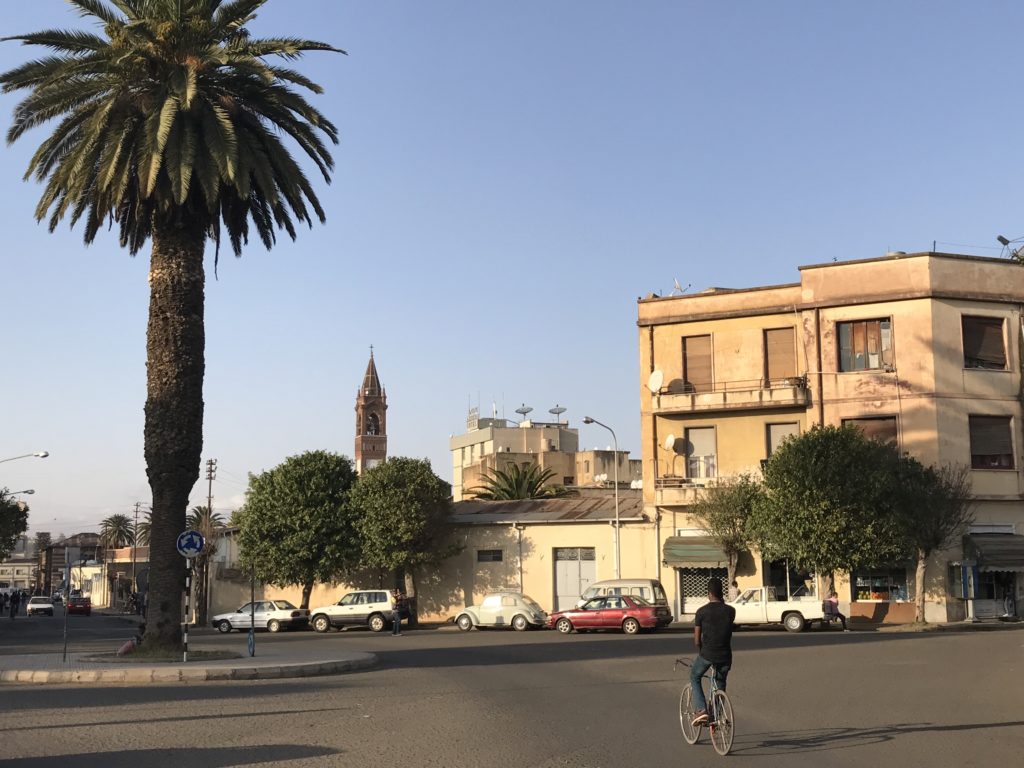
Not in a rush
The jet engines fired up as I looked out at the tarmac of Asmara International Airport—at three other planes collecting dust. The tranquil and innocent feeling—one unique to a corner of the planet doing its own thing—began to vanish with the buzz of the engines.
Inside the aircraft, the bright and clean colors of the Egyptian Air branding machine didn’t fit in with Eritrea; and like me, it was temporary and foreign. I was on the only vehicle bringing people out of the country… one of the few individuals with this freedom.
The feeling known as Asmara quickly disappeared below me as I sped at 500mph toward the modern world—to prosperous places full of technology and brands, to distractions, to WIFI, to choices and opportunities. For not one second would I want to give it all up for such simplicity and purity… choice and perceived free will are too addicting.
But to get this feeling, something has to be reduced. The world has much of what Asmara doesn’t have, but Asmara has something most of the world has not. The two forces don’t’ necessarily mix; nobody or nowhere has it all.
More than any place I’ve experienced on this planet, Asmara is a feeling…
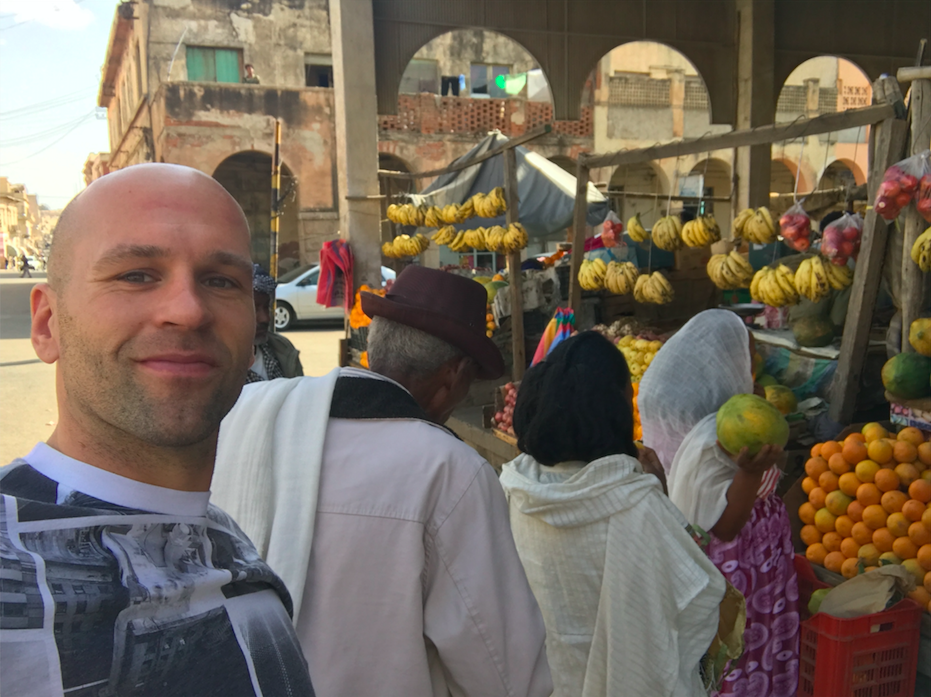
Excellent markets and papayas here
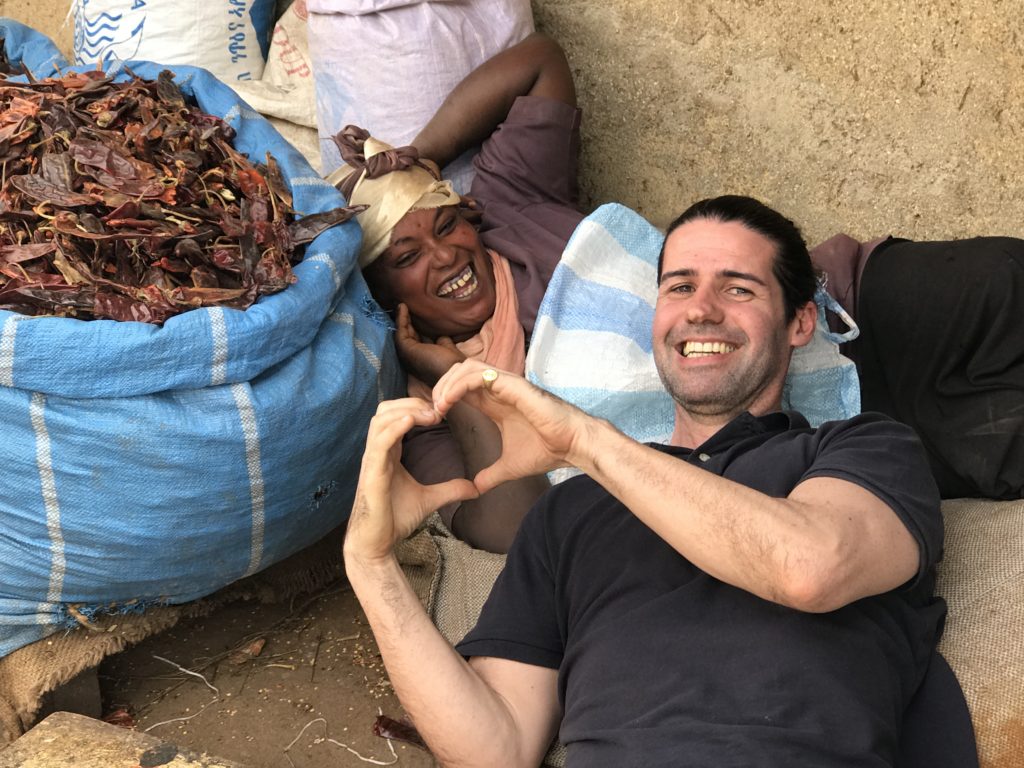
Gavin in love
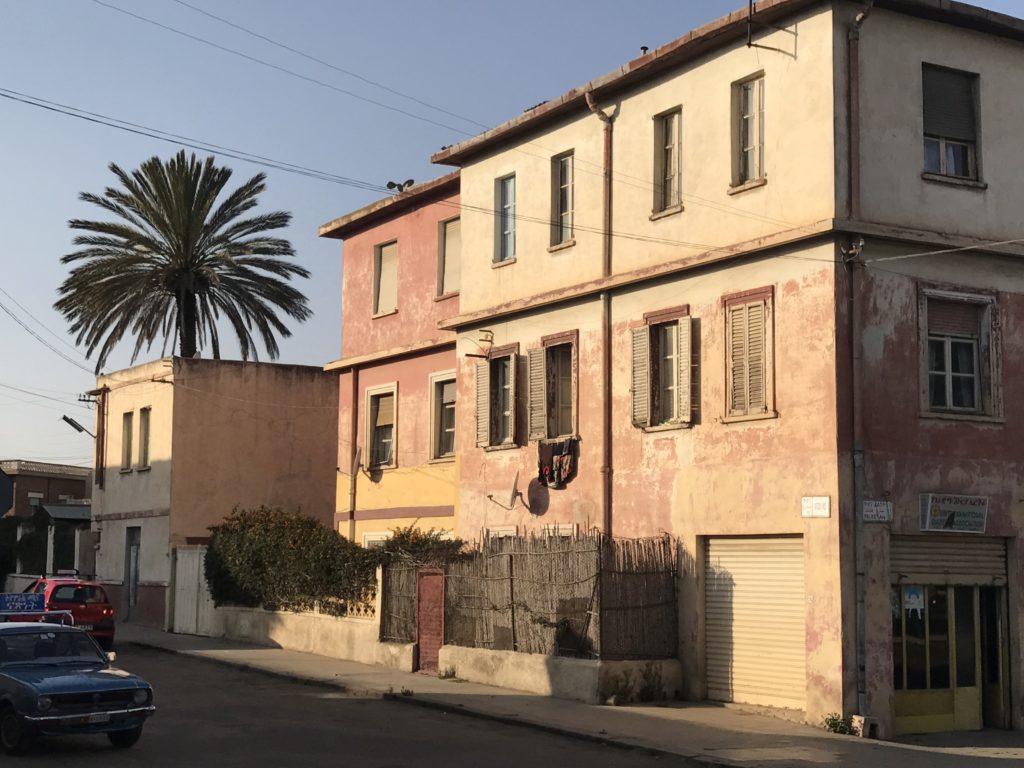
The city has many beautiful settings like this one
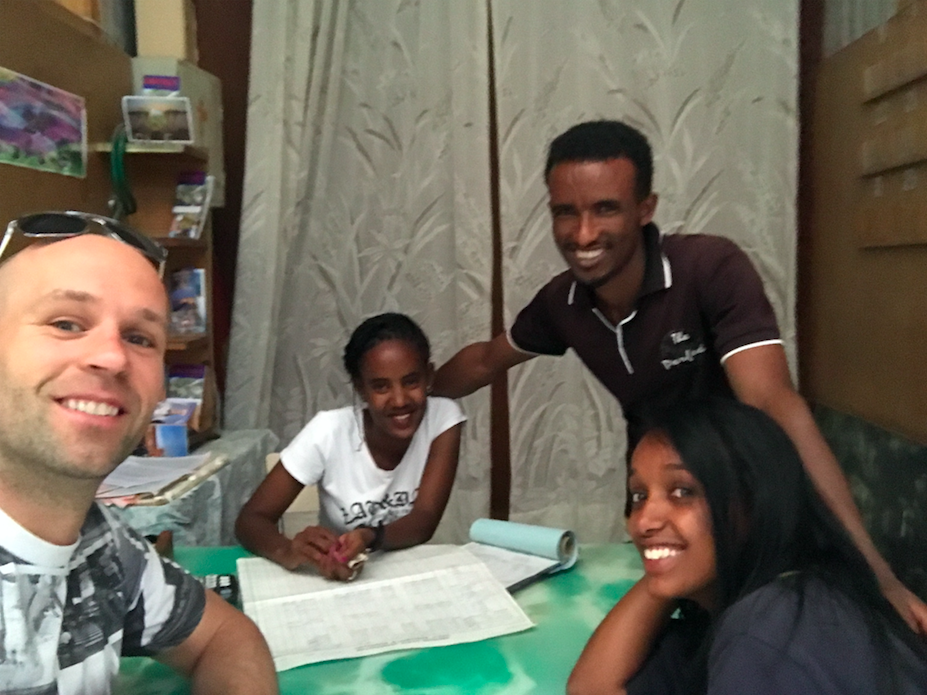
The Eritreans are very chill and open people
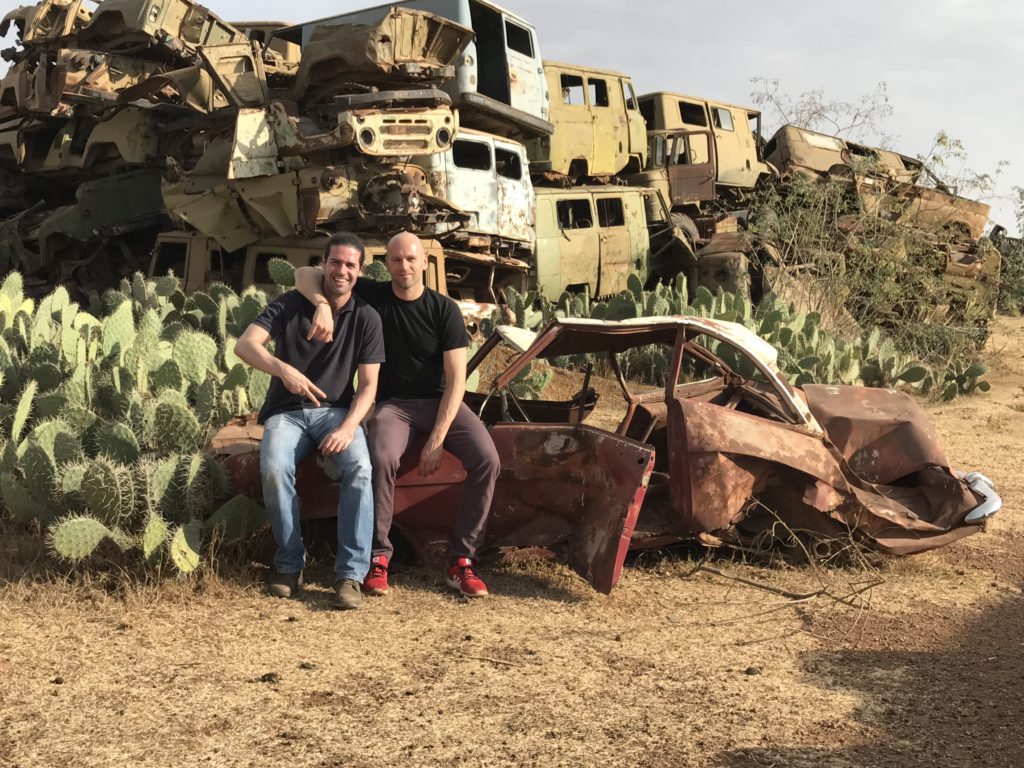
Taking a break after the first day in a radically new world
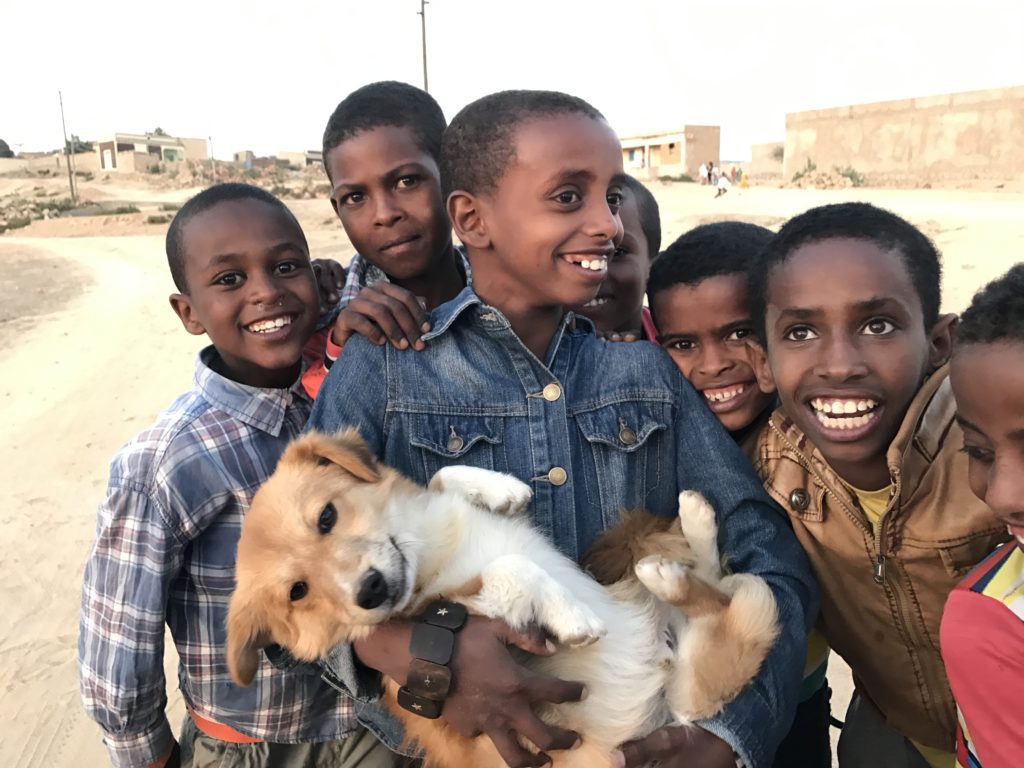
Many laughs from this clan
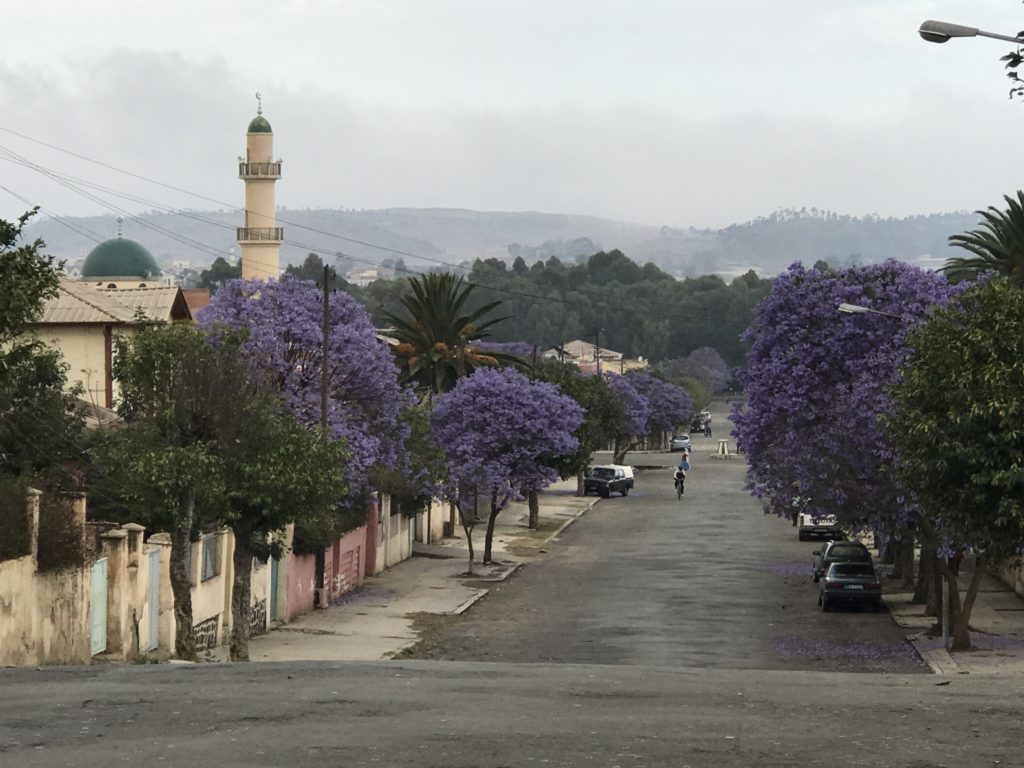
The backstreets of Asmara are full of jacaranda trees
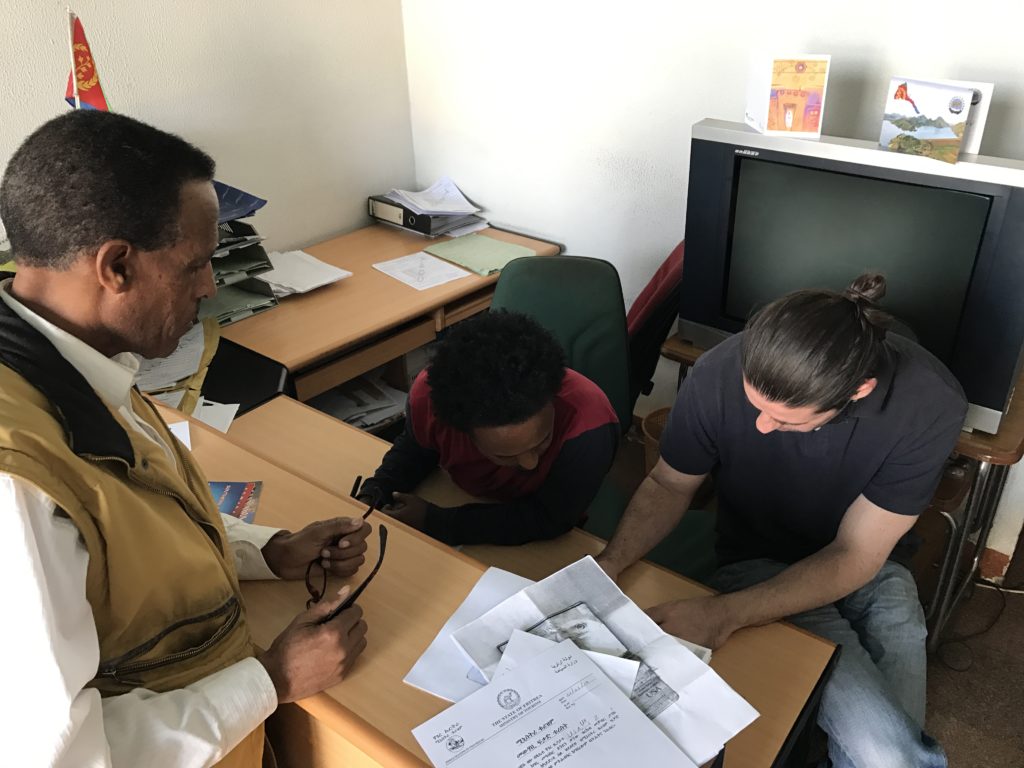
Gavin taking care of the permits. 15 years of traveling with this motley character.
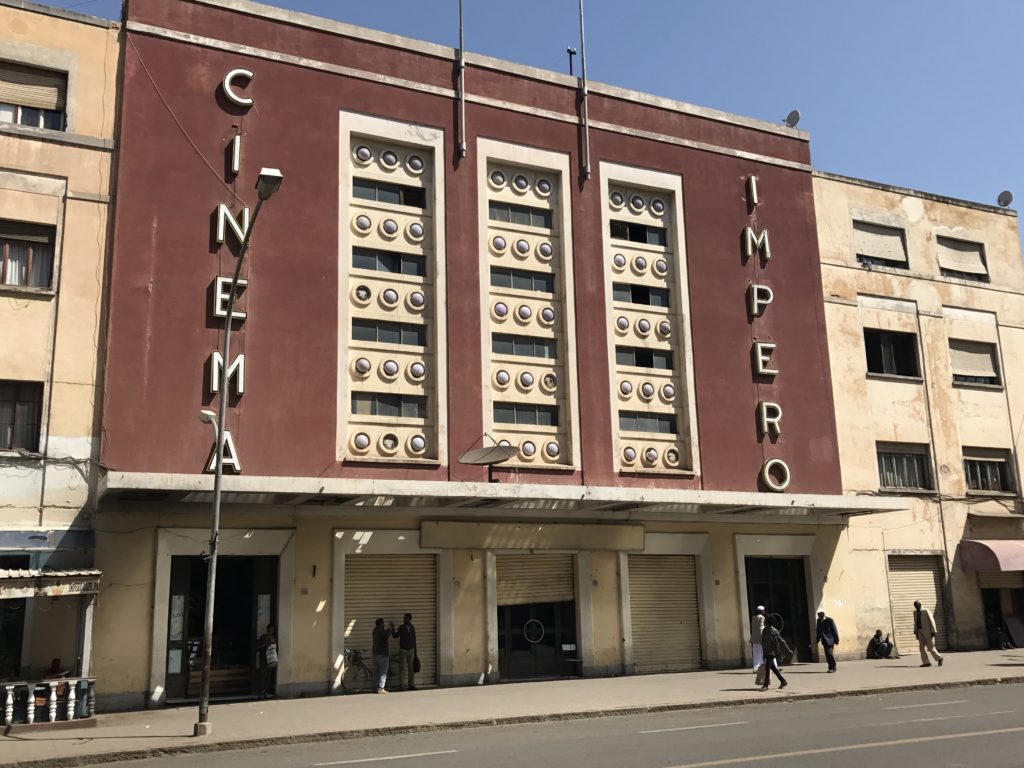
One of the many Italian-designed cinemas/theaters around the city
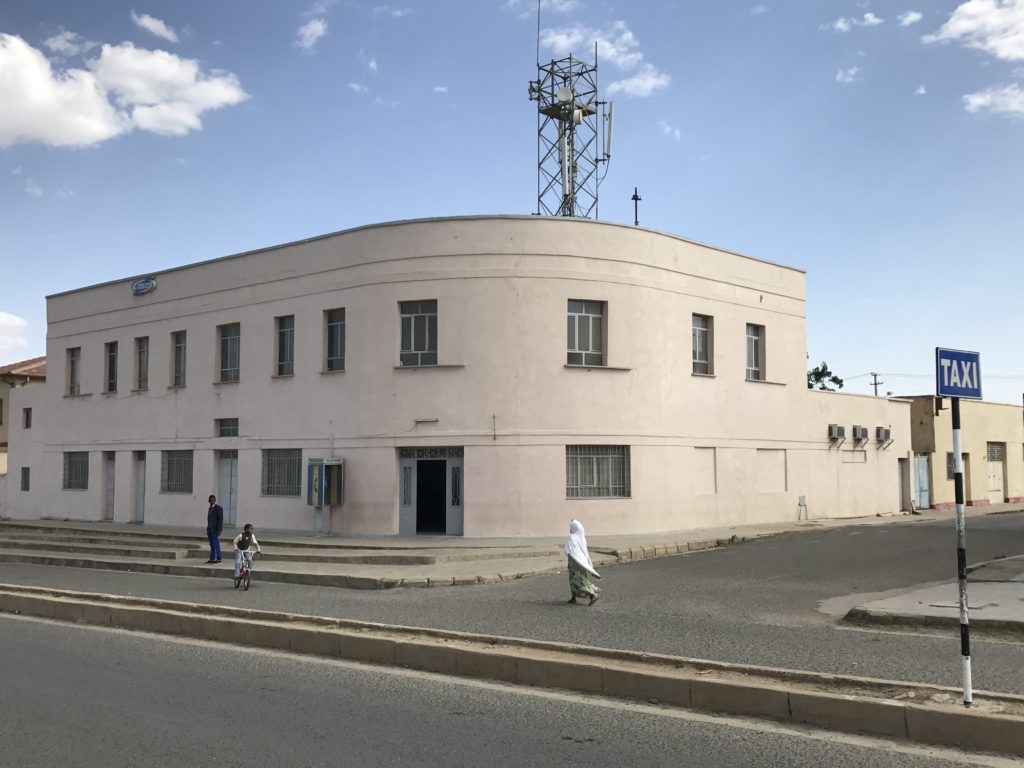
Streamline-Moderne style
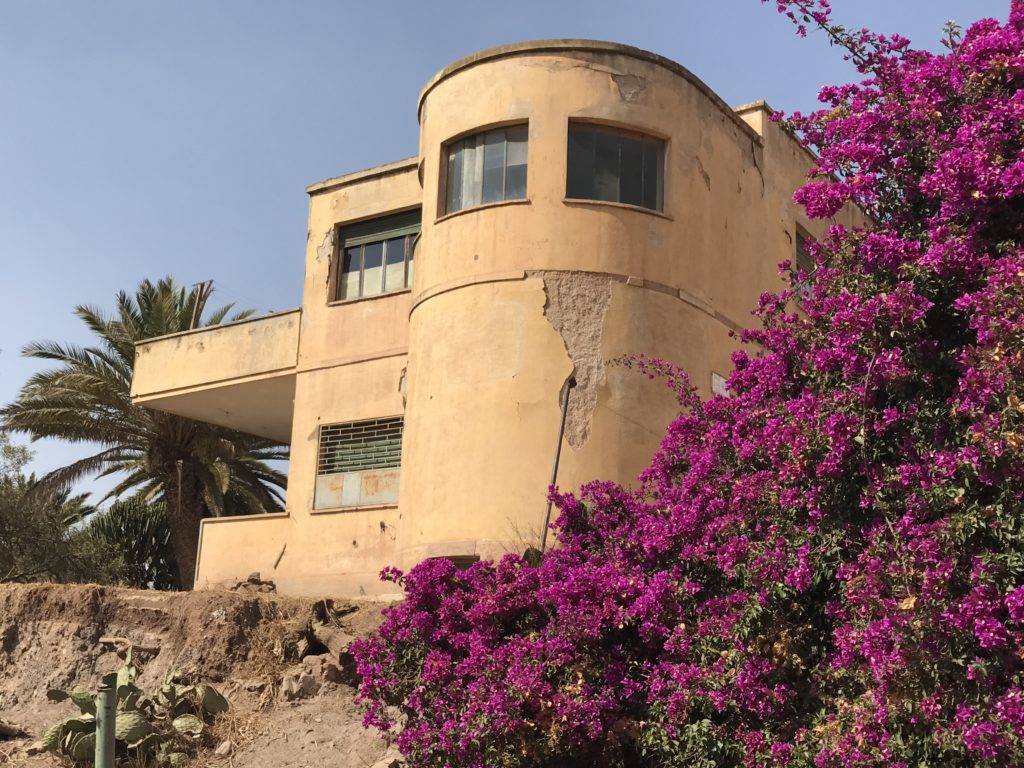
This would be an interesting one to renovate
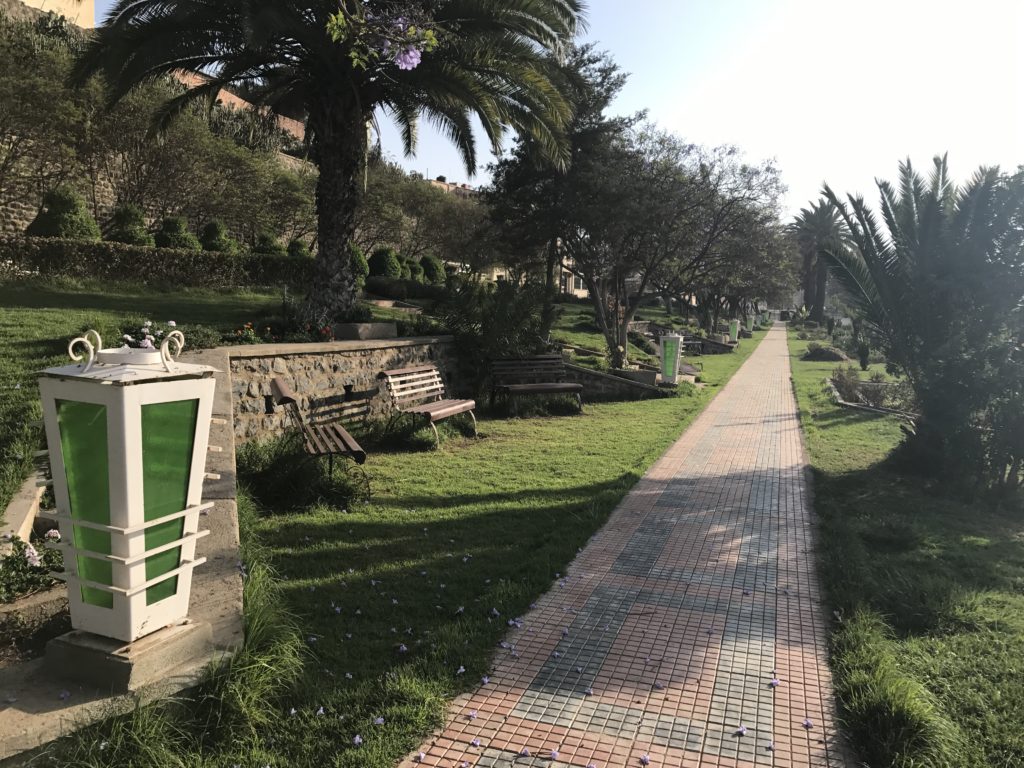
One of the few parks
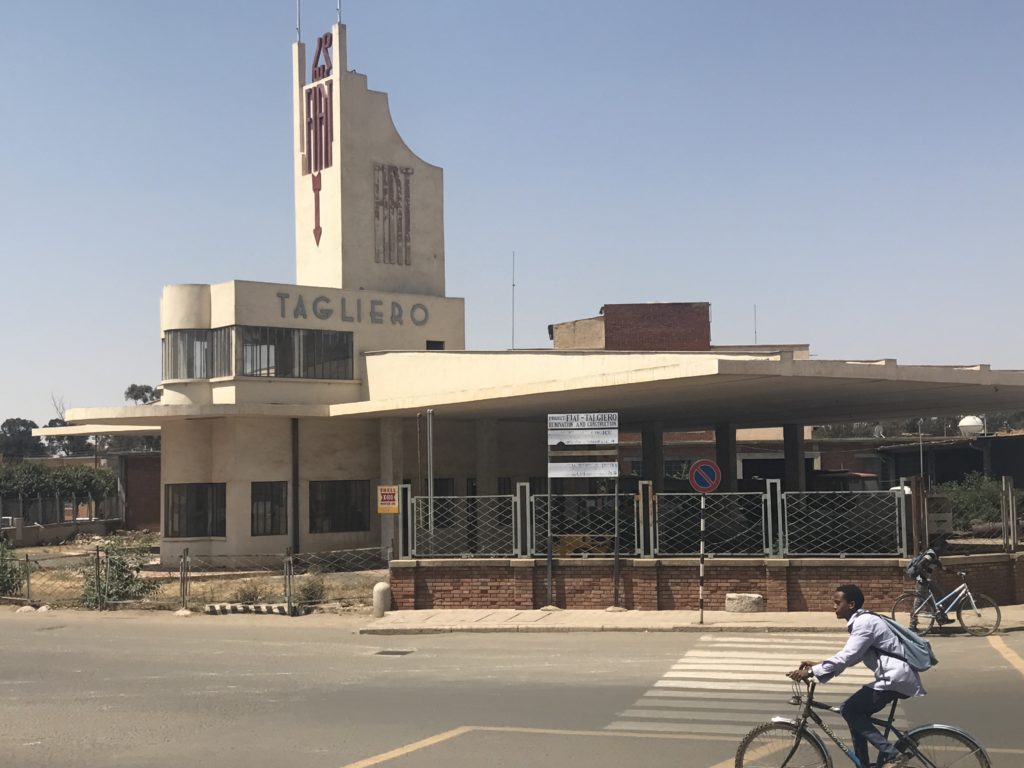
I hope this style comes back someday
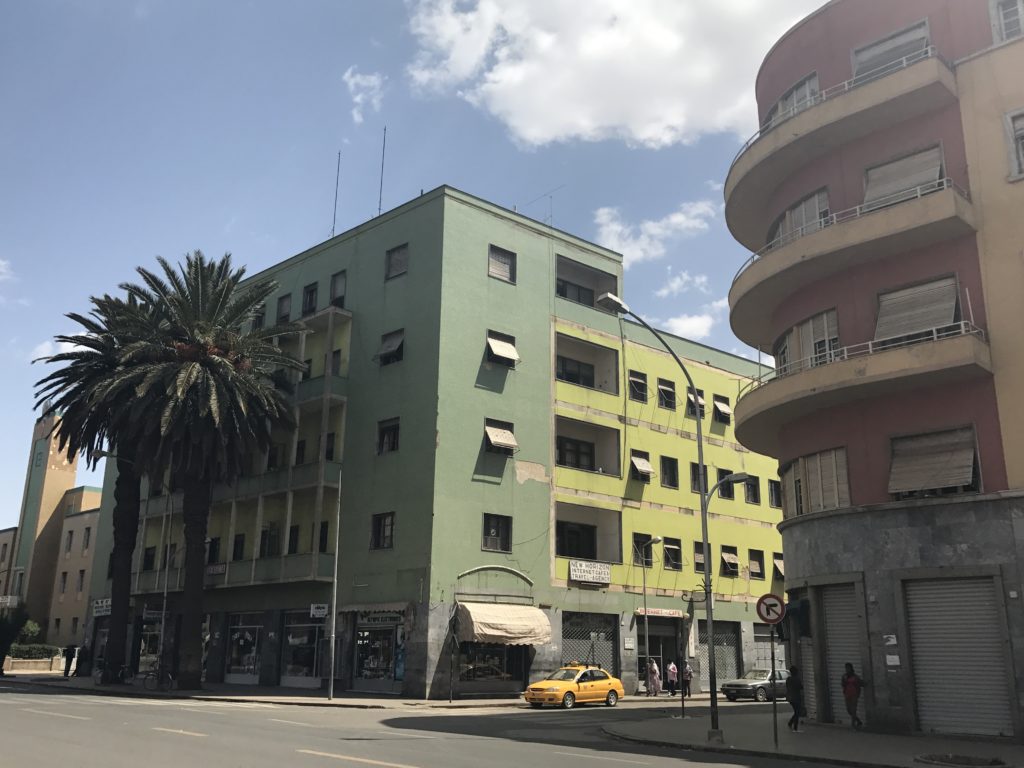
A very unique African country
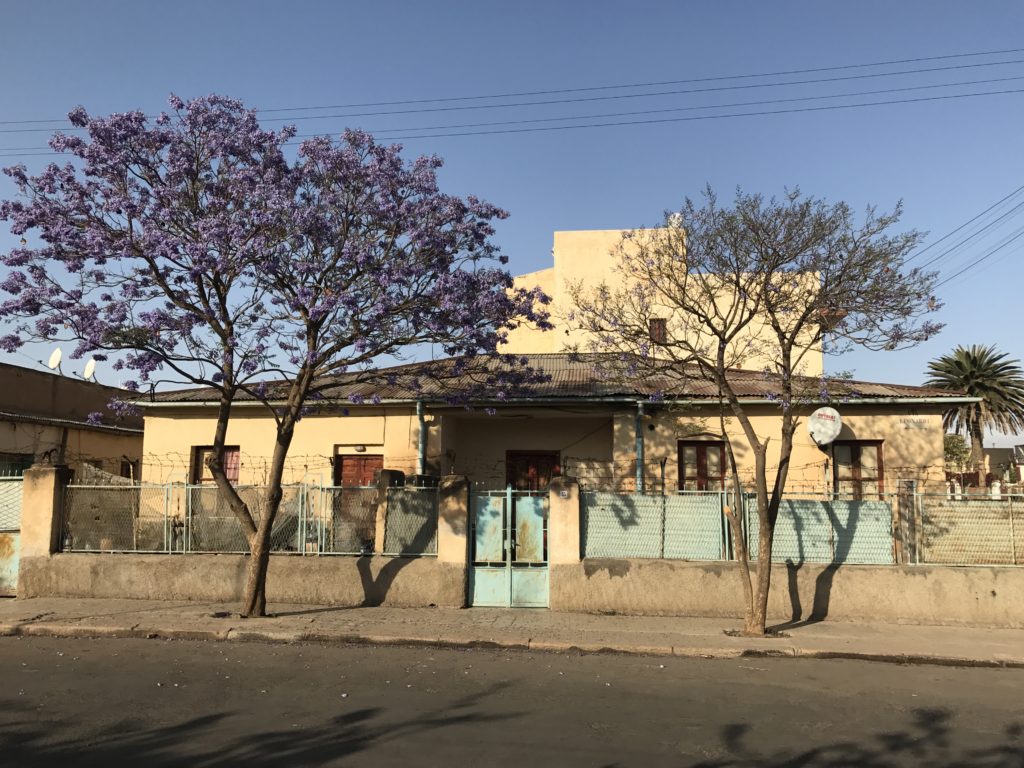
The suburbs
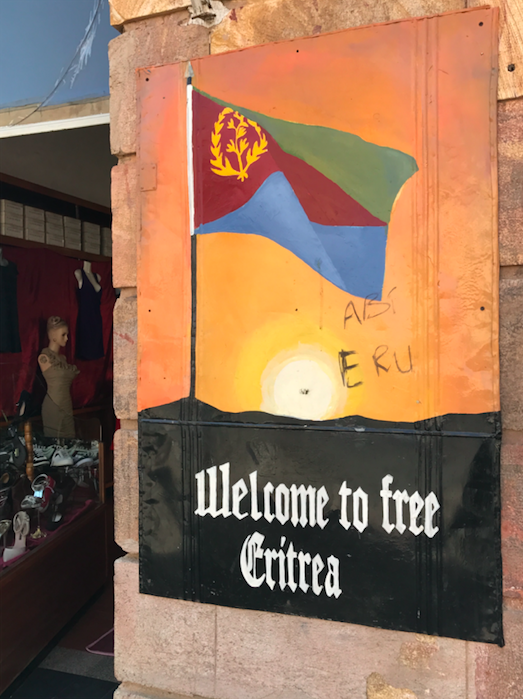
The more overtly a country states how free it is, the more I question that claim
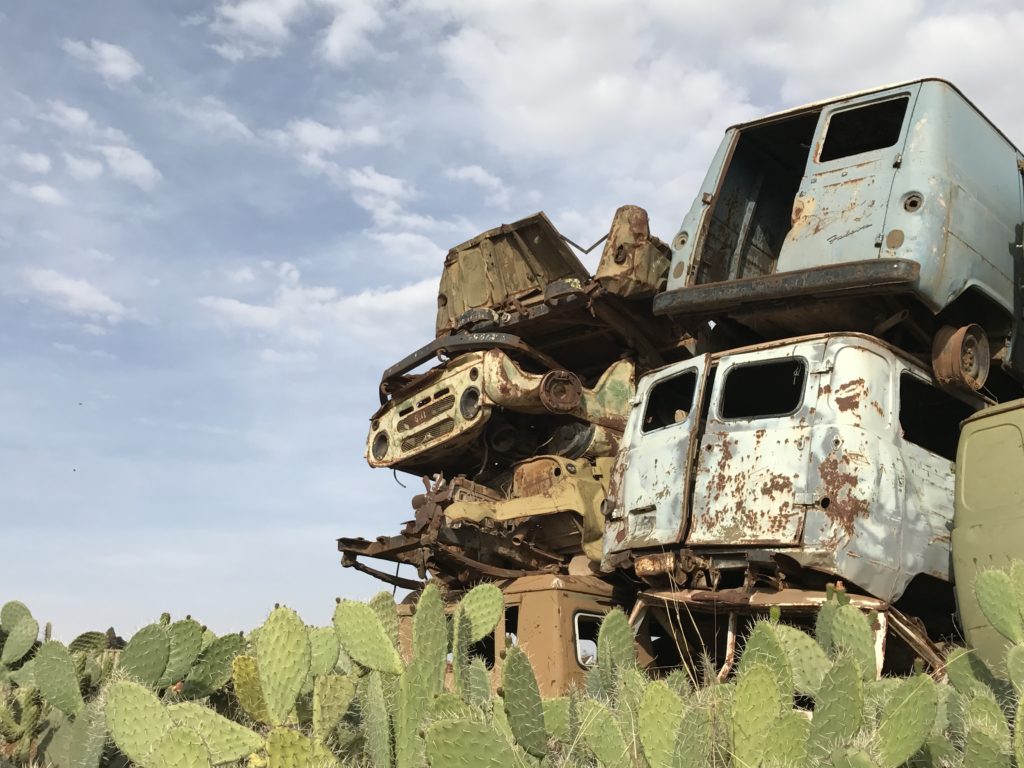
Endless amounts of scrap metal
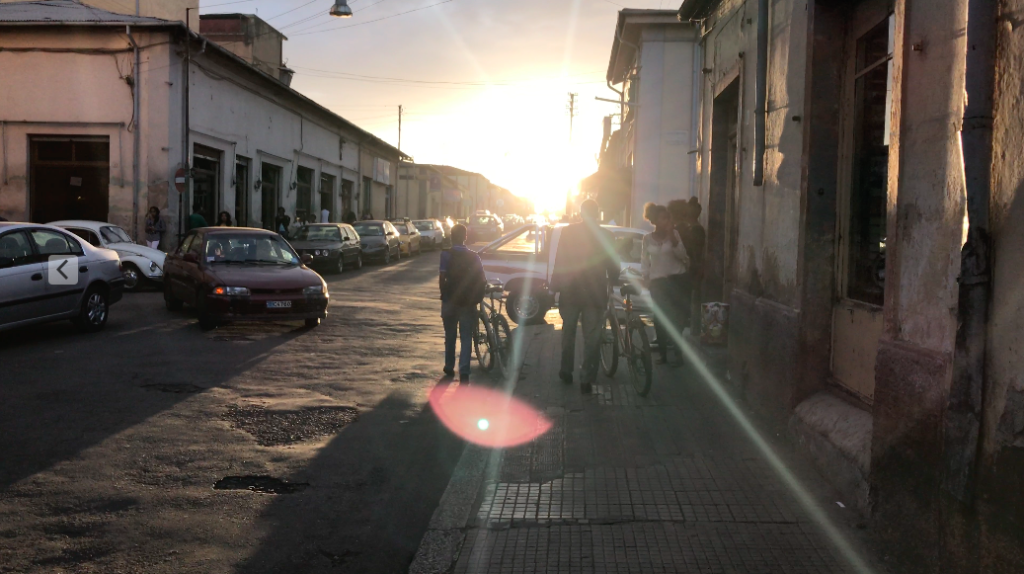
If you’re interested in more content from ASMARA and the WORLD visit these links below:
